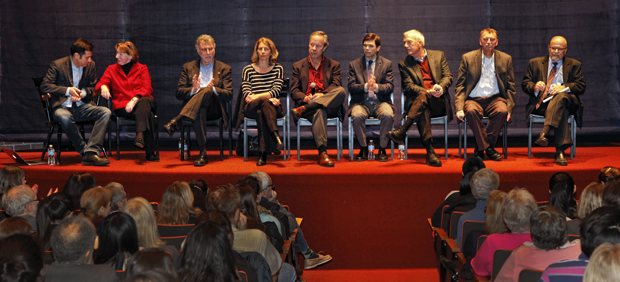Shining a ‘Spotlight’ on the need for investigative journalism
Boston Globe journalists share their collective experience of covering Catholic Church sex abuse scandal
 Photo/Mike Lovett
Photo/Mike LovettLeft to right: Josh Singer, Eileen McNamara, Martin Baron, Sacha Pfeiffer, Ben Bradlee, Michael Rezendes, Walter Robinson, Matt Carroll, John Albano
Brandeis hosted a screening of the film “Spotlight” on Nov. 9 and a panel discussion the next evening that included members of the Globe’s investigative Spotlight team.
Opening in theaters nationwide on Nov. 20, “Spotlight” tells the story of the Globe’s investigation into the Boston archdiocese and its efforts to cover up years of sexual abuse of children by its priests. The Globe’s Pulitzer Prize-winning series on the Catholic Church’s sexual abuse scandal in January 2002 led to the discovery of other cases worldwide.
The panel discussion included Spotlight reporters Michael Rezendes, Sacha Pfeiffer, Walter Robinson and Matt Carroll, Martin Baron, former editor-in-chief at the Globe, Ben Bradlee, a former Globe editor, and John Albano, the lawyer who represented the Globe in its efforts to unseal court files involving the archdiocese. Brandeis professor of the practice of journalism and former Globe reporter Eileen McNamara and Josh Singer, one the film’s screenwriters, moderated.
“The story of this investigation is what drew me in,” said Singer. “A movie has to do more than tell a story or teach a lesson, it has to entertain. When told through the eyes of the journalists, this movie keeps you entertained and tells a powerful story.”
Baron, who committed to reporting on the sex abuse scandal on his first day as the newspaper’s editor, was partly driven by a column McNamara wrote about an alleged systemic cover-up of the abuse by Catholic hierarchy.
“Her column ended with the line ‘the truth may never be known,’ and I call that chum for journalists,” Baron said. “This was an important story, one that needed to be pursued—and that’s our job, to find out what the truth is. We always have an obligation to get the story, no matter what the controversy.”
The panel discussion went on to dissect the volumes of interviews, court case research and legal gymnastics the Spotlight team conducted to objectively cover the scandal.
A question and answer session that followed the panel discussion touched on topics ranging from conflicts of interest, faith, the sensationalism and politicization of the media and the future of investigative journalism.
Each Spotlight member reaffirmed their commitment to objective reporting but underscored the importance of the long, tedious work journalists must do to inform society. But Baron, now the editor-in-chief of The Washington Post, warned that news organizations’ financial concerns often force cuts to investigative reporting teams.
“This is why newspapers need to exist,” Baron said. “They hold powerful individuals and institutions accountable in a way that no one else can. When these groups aren’t covered, they will get away with doing very bad things.”
Alice Kelikian, the chair of the Film, Television and Interactive Media program, arranged to have the film screened at Brandeis.
“’Spotlight’ is a gripping film about a compelling and true newsroom drama,” Kelikian said. “We were thrilled to partner with the Journalism program and to bring this Boston story, with global resonance, to campus.”
Kelikian worked with Maura Jane Farrelly, associate professor of American Studies and director of the Journalism program, to organize the panel in partnership with American Studies, Legal Studies, the Kraft-Hiatt Fund, the Office of the Dean of Arts and Sciences, the Schuster Institute for Investigative Journalism and the International Center for Ethics, Justice and Public Life.
“This film and the panel that followed it made the issues, challenges and themes we discuss in the classroom more real for our students,” Farrelly said. “I think the students ‘get it’ now in a way that many of them didn’t and probably couldn’t before.
“Good journalism is not easy and certainly our news landscape is riddled with flaws. But we need the much maligned ‘mainstream media,’ and this film and these journalists really brought that point home.”
Categories: General, Humanities and Social Sciences, Research, Student Life





